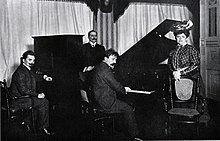Karl Bockisch

(on February 19, 1906 at the recording session for Welte-Mignon in the Leipzig studio)
Karl Bockisch (born January 10, 1874 Sternberg / Moravia ; † April 17, 1952 Freiburg im Breisgau ) was an employee, partner and managing director and most recently owner of the Freiburg-based manufacturer of mechanical musical works M. Welte & Sons and co-inventor of the Welte-Mignon reproduction piano .
Life
Karl Bockisch had been friends with Edwin Welte since they were at school . In autumn 1892 he graduated from the Grand Ducal Realschule in Freiburg. In the same year he went back to Sternberg with his family. In the fall of 1893 he began training with M. Welte & Sons in Freiburg. In 1896 he married Frieda Welte (* 1874 in Freiburg, † 1930 ibid), Edwin's sister.
In 1900 he joined Edwin Welte as a partner in the company, which now operated as a GmbH. In 1904, together with Edwin W., he registered the process for manufacturing the reproduction pianos as the German Reich patent 162,708. This was patented under the title "Device on mechanical keyboard instruments for gradation of the keystroke". Numerous patents worldwide followed. In the USA, however, one had to endure long legal proceedings because the patent was being challenged there. It was not until 1911 that the patent in the USA became final and also granted.
This patent formed the basis for the very successful Welte-Mignon piano reproduction system ; the first instruments were brought onto the market in 1905.
With this system it was possible to reproduce a pianist's playing, including the touch dynamics, as true to the original as possible. This technical marvel was a sensation then as it is today and allows an authentic reproduction of these recordings with the few well-preserved instruments.
Karl's brother Heinrich Bockisch (1876–1919) had also worked for Welte since 1910. He led the construction of the manufacturing facility of the American subsidiary, M. Welte & Sons, Inc. in Poughkeepsie , NY, which was inaugurated in 1912. During the First World War , he was managing director there instead of Edwin Welte, who had been drafted into the army in Germany.
In 1931 the Welte company ran into economic difficulties due to the introduction of new technologies such as record players, radio and sound film , and sales of expensive instruments had come to a complete standstill. Only by a judicial comparison could bankruptcy be averted. Edwin Welte resigned as partner and managing director. Karl Bockisch ran the company together with his son Karl Bockisch jr. (1899–1945) continued as a pure organ building company with a greatly reduced workforce. Large parts of the company premises were rented out. In 1932 Karl Bockisch married Ilse Tormin (1901–1988). The GmbH was converted into a OHG in 1936 due to a lack of assets. Until the destruction, in addition to repairs, new organs were also built.
In 1944 the company premises were completely destroyed in a bomb attack. In 1949 the business was resumed on a modest scale and maintained until 1951. After Karl Bockisch's death in 1952, the once world-famous company finally went out after 120 years.
literature
- Automatic musical instruments from Freiburg into the world. 100 years of Welte-Mignon . Augustinian Museum; Exhibition from September 17, 2005 to January 8, 2006. With contributions from Durward R. Center, Gerhard Dangel [u. a.]. Freiburg: Augustinermuseum, 2005.
Television movie
- Playing the piano himself: Welte-Mignon and mechanical music. Script and direction: Oliver Becker. SWF / LOFT 1998.
Web links
- Welte-Mignon-Portal for mechanical musical instruments Patent from 1904, photo by Karl Bockisch and the patent.
| personal data | |
|---|---|
| SURNAME | Bockish, Karl |
| BRIEF DESCRIPTION | German musical instrument maker |
| DATE OF BIRTH | January 10, 1874 |
| PLACE OF BIRTH | Sternberg (Moravia) |
| DATE OF DEATH | April 17, 1952 |
| Place of death | Freiburg in Breisgau |